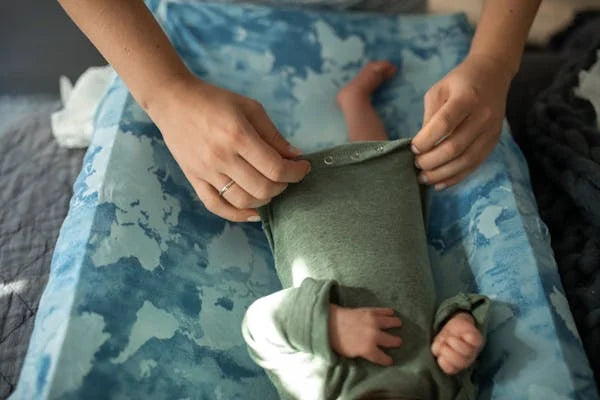Startseite
Pregnancy, Breastfeeding, and Pumping: The Ultimate Guide for Moms
How Long Does Breast Milk Last After Pumping: A Comprehensive Guide

How Long Does Breast Milk Last After Pumping: A Comprehensive Guide
Breast milk is a precious resource for both mother and baby, providing essential nutrients and antibodies that support a child's growth and development. For many mothers, pumping breast milk is a practical solution to ensure their baby receives the benefits of breast milk even when they are not physically present. However, understanding how long breast milk lasts after pumping is crucial to maintaining its quality and safety. This comprehensive guide will walk you through everything you need to know about storing and using pumped breast milk effectively.
Understanding Breast Milk Storage Basics
Proper storage of breast milk is key to preserving its nutritional value and preventing contamination. Freshly pumped breast milk can be stored at room temperature, in the refrigerator, or in the freezer, depending on how soon you plan to use it. The storage duration varies based on the method you choose, and adhering to these guidelines ensures your baby receives safe and healthy milk.
How Long Does Breast Milk Last at Room Temperature?
If you plan to use the milk within a few hours, storing it at room temperature is a convenient option. Freshly pumped breast milk can last up to 4 hours at room temperature, ideally between 60-77°F (16-25°C). However, if the room is warmer, it is best to use the milk within 2 hours to avoid spoilage. Always ensure the milk is stored in a clean, covered container to protect it from contaminants.
Refrigerating Pumped Breast Milk
For longer storage, refrigeration is an excellent choice. Freshly pumped breast milk can be stored in the refrigerator at 39°F (4°C) or lower for up to 4 days. Place the milk in the back of the refrigerator, where the temperature is most consistent. Avoid storing it in the door, as temperature fluctuations can affect its quality. Label the container with the date and time of pumping to ensure you use the oldest milk first.
Freezing Breast Milk for Extended Storage
If you need to store breast milk for an extended period, freezing is the best option. Freshly pumped breast milk can be stored in a freezer at 0°F (-18°C) or lower for up to 6 months, though using it within 3 months is ideal for maintaining its nutritional value. Use airtight containers or breast milk storage bags specifically designed for freezing. Leave some space at the top of the container, as breast milk expands when frozen.
Thawing and Using Frozen Breast Milk
When you're ready to use frozen breast milk, thaw it safely to preserve its quality. The best way to thaw frozen milk is by placing it in the refrigerator overnight. Alternatively, you can hold the container under warm running water or place it in a bowl of warm water. Avoid using a microwave, as it can create hot spots that may burn your baby's mouth and destroy valuable nutrients. Once thawed, use the milk within 24 hours and do not refreeze it.
Signs That Breast Milk Has Gone Bad
It's essential to check for signs of spoilage before feeding your baby. Spoiled breast milk may have a sour or off smell, and its texture may appear clumpy or separated even after shaking. If you notice any unusual changes, discard the milk immediately. Always trust your instincts—if something seems off, it's better to err on the side of caution.
Tips for Maintaining Breast Milk Quality
To ensure your pumped breast milk remains safe and nutritious, follow these tips:
- Wash your hands thoroughly before pumping and handling breast milk.
- Use clean, sterilized containers for storage.
- Label containers with the date and time of pumping.
- Store milk in small portions to minimize waste.
- Follow the first-in, first-out rule to use older milk first.
Common Questions About Breast Milk Storage
Many mothers have questions about breast milk storage, and it's important to address these concerns to ensure peace of mind. Here are some common questions and their answers:
- Can I mix freshly pumped milk with refrigerated milk? Yes, but cool the freshly pumped milk in the refrigerator before combining it with older milk.
- Can I reuse leftover milk from a feeding? It's best to discard any milk that has been in contact with your baby's mouth to avoid contamination.
- How do I know if my storage containers are safe? Use containers made of food-grade materials and avoid those containing harmful chemicals like BPA.
The Importance of Proper Breast Milk Storage
Proper storage of breast milk is not just about convenience—it's about ensuring your baby receives the best possible nutrition. Breast milk contains live cells, antibodies, and enzymes that can be compromised if not stored correctly. By following these guidelines, you can protect the integrity of your breast milk and provide your baby with the healthiest start in life.
Understanding how long breast milk lasts after pumping empowers you to make informed decisions about feeding your baby. Whether you're storing milk for a few hours or several months, these tips will help you maintain its quality and safety. With the right knowledge and practices, you can ensure your baby benefits from the incredible gift of breast milk every time.
Teilen


